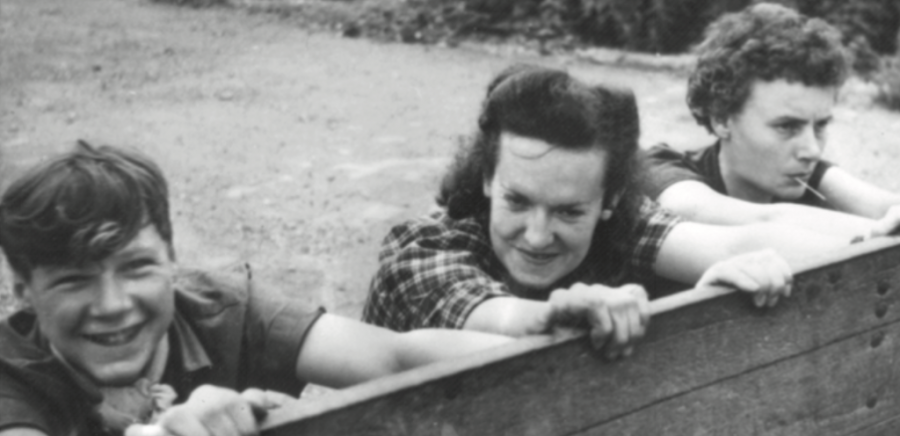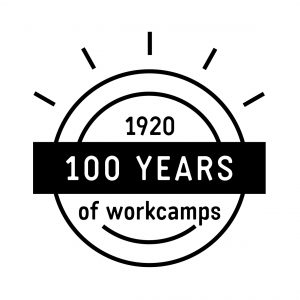Workcamps – 100 anni di storie

Name of the testimonial: Arthur Gilette
Sending Organization: S.C.I. USA
Year of the workcamp: 1960
Place of the workcamp: A collective farm in Ukraine
Host organization: the village
What was your motivation to join a workcamp?
I was born and raised in the eastern United States and one of my earliest memories of the media was watching, at the age of 12, live television broadcasts on the Council of Security of the United Nations, where we saw Soviet Foreign Minister Andrei Vyshinsky (Mr. Niet) regularly vetoing the measures supported by a majority of the other members. The summer of my 15th birthday, my compatriots Julius and Ethel Rosenberg were executed on the electric chair for “betraying atomic secrets” for the benefit of the Soviets.
The Boy American Scouts were strongly encouraged to speak out against “communist” activities they might encounter.
Fortunately, my parents leaned strongly towards internationalism and were, for example, founders of the local branch of the United Nations association.
So I grew up in an environment where the Russians or the Communists were not automatically seen as emanations of the devil. My high school was also openminded (we taught Russian there!) And some of my teachers were even labeled as Communists (when at least some of them were actually Quakers) by the Senator’s witch hunt McCarthy. Autonomy and service were part of the curriculum and were taken for granted when I joined Harvard University (near Boston).
This is how I got in touch with the Society’s Voluntary Service Committee.
Friends (the Quakers) and started weekend sites in Roxbury, a black and Hispanic ghetto in Boston.
What did you take from that experience?
During the summer of 1960, I was part of the team led by Henri Majewski, who participated in the second workcamp in the USSR, to build the foundations of a secondary school on a collective farm in central Ukraine. It was my first East-West project and a real opening!
Although sufficiently convinced of the value of the project, since they had signed the contract, at least some of the civil lawyers found themselves at first somewhat in the situation of the sailors of Christopher Columbus discovering unknown lands. With some trepidation, we wondered “What if after all the Earth was flat and we had to go overboard”.
Volunteers, Soviet and foreign (about 80), gathered in Moscow for the overnight train trip to Ukraine. At the beginning, it was a little awkward conversations to get to know each other in the different compartments that were reserved for us. “So you are an American who learns Russian? Asked a
somewhat suspicious Soviet volunteer (understand: “Ah, you probably belong to the CIA …).
Conversely, a Western volunteer asked a language student from Leningrad: “So you specialize in African studies? (Implying: “It is undoubtedly a question of preceding a communist penetration in the recently
independent countries of the continent”).
The Russian site manager tried to break the ice by making a speech on mutual understanding between young people from different blocks. I remember thinking, “He must be a Party spy, or even a KGB spy.” His speech was listened to in icy silence. He laughed and said, “Okay, guys, we’re going to work together to deal with the problem.” The “problem” was how many of us could fit into a compartment designed for eight people. We arrived at… 19! The laughter that followed finally broke the ice and we started to sing. It was then that a controller arrived to see what the heckling was all about. He berated the leader of the group so brutally that I thought he could not be a Party spy or a KGB agent. In fact, at the construction site, he became my neighbor under the tent. On the collective farm, we worked hard by forming a united team and we achieved the objectives.
Frankly, we had a good time: after all, the Earth was really round!
What do you still carry with you?
I doubt that most human beings can be conditioned by a single experience. A personality is built from a diversity of experiences and commitments, as well as the goals that we have set for ourselves. As far as I am concerned, the work sites of the SCI and other voluntary activities have certainly determined my orientation. It was natural, for example, that I had completed my two years of civilian service as a conscientious objector to the Coordination Committee. With other colleagues with the same status and the same ideas, we had set ourselves two priorities: the development of East-West exchanges and the training of volunteers for the Third World.
This led me to join UNESCO where, during a varied career which lasted almost 30 years, I constantly tried to put actions before words, in other words innovative practices rather than eternal declarations of good
intentions.
When I retired in 1998, a Ambassador to UNESCO told me with a laugh
that a very high-ranking official in the organization disdainfully told him (ignoring that we were friends): “Ah yes, Gillette … a worker, but too concerned with down to earth details, like a scout doing his BA ”. It was supposed to be insulting, but I took it for a compliment.




